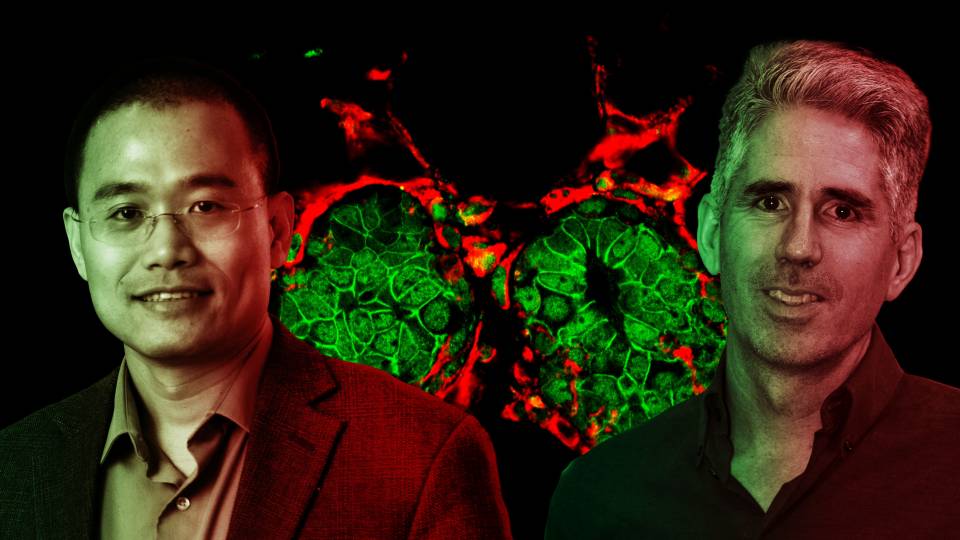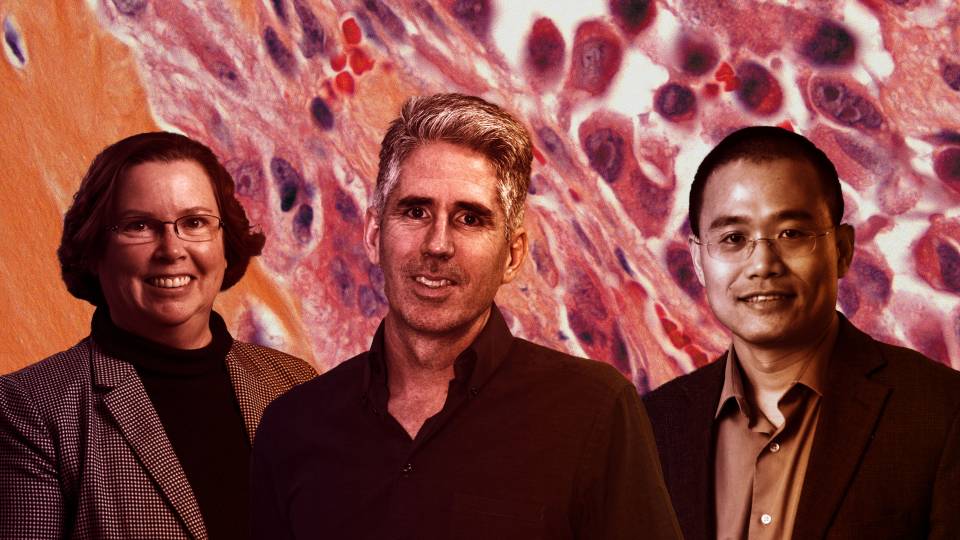From the Jan. 8, 2007, Princeton Weekly Bulletin
Josh Rabinowitz has a scientific background that allows him to work in both the industrial and academic worlds, and sometimes the biggest challenge for a person like him can be finding the best fit.
Rabinowitz knows — he’s spent time on both sides of the house. He’s now an assistant professor with appointments in both the Department of Chemistry and the Lewis-Sigler Institute for Integrative Genomics. But until about two years ago, he worked on the other side of the country for a startup pharmaceutical company.
“I have always enjoyed research,” said Rabinowitz, “whether examining patient data in a hospital, trying to design a drug at a company or studying a system of biochemical reactions in an academic lab. I feel lucky to have had the chance to work in both an academic and industrial setting, and learned a lot in industry that helps me in the classroom.”
Rabinowitz graduated from the University of North Carolina-Chapel Hill in 1994 with bachelor’s degrees in mathematics and chemistry. While an undergraduate, he worked as a research assistant in the bone marrow transplant lab at Duke University Medical Center.
He completed a Ph.D. in biophysics at Stanford in 1999, then stayed on another two years to earn a medical degree in 2001, an education that opened a number of career avenues for him. While weighing his options, his Ph.D. adviser introduced him to Alejandro Zaffaroni, a scientist and entrepreneur who had founded several companies.
“Zaffaroni cut an inspiring figure,” Rabinowitz said. “He knows a great deal about developing new systems of drug delivery, and over the years has been part of the teams that developed both the birth control pill and the patches that help people stop smoking.”
When Rabinowitz met him, Zaffaroni was starting another company based on an interesting concept.
“He was inspired by smoking,” Rabinowitz said. “He recognized that smoking is highly addictive in part because inhalation is an effective way to deliver nicotine to the body. The idea was to find ways to vaporize other, helpful drugs without breaking down their molecular structure, so they could be absorbed quickly and start working.”
Ultimately, Rabinowitz was attracted to the idea of using his scientific knowledge to benefit people in immediately tangible ways. He co-founded, with a team including Zaffaroni, Alexza Pharmaceuticals in Palo Alto, Calif. While the company was still a private venture, Rabinowitz worked as part of the research team that was attempting to find molecules that could be applied to specific problems — migraine headaches, panic attacks, cancer pain — but would also survive the vaporization process.
Rabinowitz described the four years he spent at Alexza as both fun and intellectually rewarding. As time passed, however, he saw that their young startup would soon have to change focus if it was to stay in business.
“Drug development is a slow process, but companies eventually have to evolve from a research orientation to a manufacturing orientation,” he said. “The question before me was, do I want to be a researcher or an executive? I ultimately decided I didn’t want to get that far from the lab so early in my career.”
A fortunate visitWhen a business trip brought him to Philadelphia, Rabinowitz called David Botstein, the director of Princeton’s Lewis-Sigler Institute for Integrative Genomics. Botstein, he knew, had been on the faculty at MIT and Stanford, but had also spent time at Genentech, a biopharmaceutical company in California, where he searched for genes that are connected to particular diseases.
“I knew David’s work, so I asked if he had some time to talk over my options,” Rabinowitz said. “He made time to see me, so I drove up to campus.”
Botstein ended up recruiting him for Princeton, which has been Rabinowitz’s home for two years. Botstein said that the perspectives of having worked in industry are useful even to a scientist who ultimately decides on an academic career.
“Intellectually, it is hugely useful to know what is practical,” he said. “I’m a firm believer in basic research and following your nose, wherever it may lead you. But you also want to know how to facilitate application of the ideas you have. Knowing both sides helps you make your case more effectively to the executives in the company, and it is good for a teacher as well. Some of our students will choose to go into industry, and we can help them better.”
Rabinowitz said that a university setting provides the added freedom of working on longer-term projects that a company might not be willing or able to finance.
“In academia you can explore whatever idea you find interesting. In industry, you must be more practical,” he said. “The drug industry’s definition of ‘interesting’ has a time horizon. A couple of years might be acceptable to a venture capitalist, whereas many fundamental problems of great long-term importance need to be tackled over the decade-long timescale, something which academia can allow you to do.”
Building blocks
The long-term problem that Rabinowitz is addressing at Princeton
regards cellular metabolism, the process of cells taking in nutrients
and converting them into energy and biochemical building blocks. His
goal is to further understanding of the “metabolic network,” a set of
about 500 interrelated molecules that achieves this essential function.
“We now have a basic idea of how these molecules are related, for example, but we don’t know the numbers, the amounts that are moving,” he said. “If you add a drug blocking one, how do the other numbers change? It’s going to take some time to figure this out, but once we do, it will open new avenues in treating obesity, diabetes and cancer.”
Being at Princeton offers the potential to tackle the problem from the bottom-up, thoroughly and rigorously, Rabinowitz said, rather than having to immediately focus in on a particular product.
“Building the foundation on which many future practical discoveries will be based, and at the same time building bridges between chemistry and biology, is a huge part of what excites me about being here,” he said.
Alexza went public in March, and Rabinowitz still consults for them (as Botstein does for Genentech). But though Rabinowitz relishes his time in industry, he said he is glad to be back in a university environment.
“I spent four years away from academia, and the transition back has been an intellectual challenge,” he said. “But the atmosphere globally at Princeton is very collaborative and full of bright people. These are the things that made science fun for me from the beginning.”




